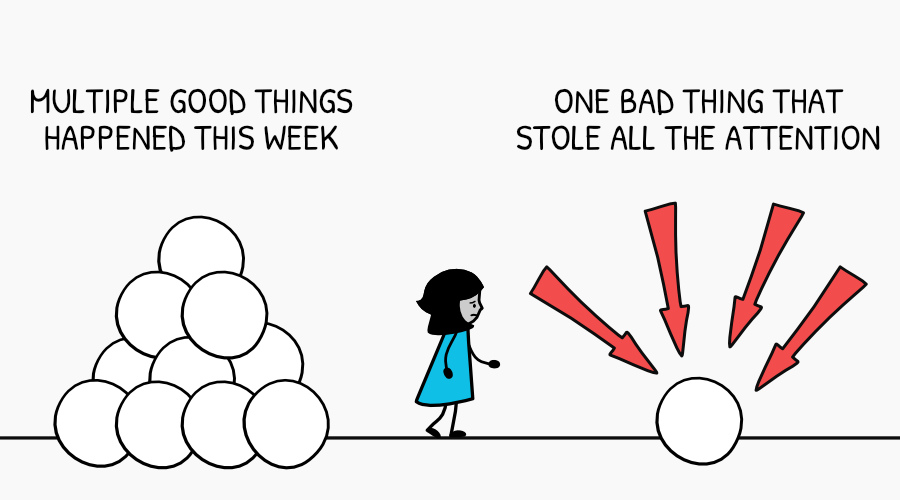My Negativity Bias Was ShowingIt shows in all of us. It's our natural tendency to invest more time, energy and attention to negative life events and circumstances, over positive ones. That's to say, psychologically we're wired to focus on negativity. I know, as a glass-half-full optimist, this realisation doesn't sit well with me either. But research shows that humans, even infants as young as 3 months old focus for longer on negative stimuli, than positive. Our worst case scenarios linger with greater intensity than cheery outcomes, as seen in everyday life. Think about it. We dwell on accidents, errors, and financial losses, more than we dwell on the good times. We experience the pain of losing a client far longer than the joy of winning a new one. We find it easier to relate to someone having a bad day, than someone having a good day. We learn more from our mistakes, than our successes. This bias towards negativity is why an author can publish a New York Times bestseller, receive 500+ awesome reviews, yet fixate on the 10 or so reviewers who left negative comments. And why a talented designer with an outstanding portfolio feels dreadful when a client tells them the final design (the one they've poured hours into), just isn't cutting it. In both cases, we forget about all the good stuff we've achieved, and focus on the one tiny speck of negativity. We're quick to spot the negative, but slow to focus on the good. Why Do We Lean Towards the Negative?Let's jump back a few million years or so. You wake up on a Sunday morning, stretch, then look over at your spear. You won't be needing that this morning, you say to yourself. It looks like it's going to be a great day. So you grab your cloak and off you pop down to the Savannah to rustle up some berries for breakfast. On your travels you spot a mountain lion sitting peacefully on top of a rock. The lion looks magnificent, with it's golden shiny fur and regal poise. You assume the 'friendly' lion has already eaten, and is therefore not a threat. The lion takes one look at you, and sees it's first meal of the day. Our ancestors lived in savage times. They needed to develop wits of steel if they were ever to survive predators with big teeth or poisonous venom. So, 99% of the time, they ran around viewing everything as a potential menace. Skipping along with rose-tinted glasses in those days could get one's ass killed. We don't have the same dangers today, obviously, but we've kept the same instincts. We err on the side of negativity because that's what keeps us (read: our egos) safe. Next week, I'll share some tips on how to handle negative comments, including my three-tier system for deciding what to listen to (and what to ignore). Plus a tool you can use when you need an instant pick me up. Mena x | 


